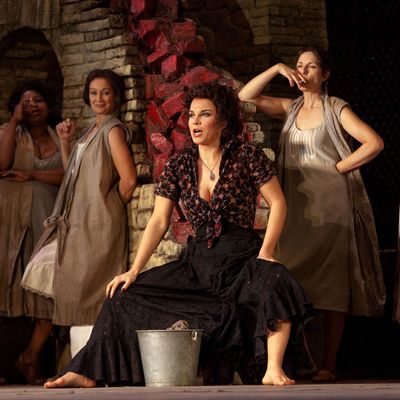
The worlds of opera and classical music have had plenty of experience preparing for the day when their public would vanish, though they did think it would happen more gradually. To forestall the end-time, many organizations jumped into streaming years ago, unearthing archived recordings and old radio and TV broadcasts, and pushing out those, as well as live performances, over the internet. There are few forms of cultural expression less suited to phones and earbuds, which compress big drama, vast stages, and deep orchestral sound into a pair of narrow runnels, but if you can bump the picture to a more generous screen and the sound to decent speakers, you can approximate something of the live experience. What chicory was to coffee during World War II, livestreaming is to live performance.
Classical music is simultaneously global and intensely local, which is why artists are almost continually on tour. The worldwide closure of concert halls means that, for a while, nobody will be going anywhere, but all of us can hear music from all over the world, much of it for free. Thanks to its superb Digital Concert Hall, the Berlin Philharmonic is now your neighborhood orchestra. At the same time, audiences barricaded at home all over the world are suddenly open to stumbling on specialized and local organizations, such as the New York Festival of Song, which streamed and posted last Sunday’s concert from the Caramoor Center for Music and the Arts in Katonah. Rarely has a program called “The Art of Pleasure” felt more essential.
The Metropolitan Opera is streaming past performances nightly, attracting such large audiences that on opening night of its new virtual season, even before the curtain went up on Carmen, the site crashed. The company has a copious and well-curated archive of live performances, so a week at the virtual Met is a week without duds or off nights. I’m looking forward to the March 22 stream of Tchaikovsky’s Eugene Onegin. That memorable 2007 performance, conducted by Valery Gergiev, with Renée Fleming near her peak and the late Dmitri Hvorostovsky in the title role, was one of the first that the Met broadcast to movie theaters, leading the charge beyond the building’s walls.
We have the company’s foresight to thank for the fact that so many other organizations, large and small, are primed to go online. The Bavarian State Opera, for example, has a robust streaming platform that is currently showing two-week runs of its repertoire, including tenor Jonas Kaufmann at his peak in Verdi’s Il Trovatore, from 2013. OperaVision, a clearinghouse for streaming opera from all over Europe, has suddenly become an emergency resource, assembling an online Mozart festival out of productions like the Glyndebourne Festival’s production of Die Entführung aus dem Serail (The Abduction From the Seraglio).
Even amid calamities and emergencies, audiences and artists need each other. Directives to limit the size of gatherings mean that orchestras in many places can’t rehearse or perform, even for an empty house. That places the burden of keeping music alive on individual performers. I think of the “Cellist of Sarajevo,” Vedran Smailović, who in the Bosnian War of the 1990s braved sniper fire and artillery to play amid the ruins of his city. Today, even that noble gesture is quickly becoming impossible. Instead, the pandemic has launched an impromptu worldwide piano festival. Some, like Igor Levit, are taking to Twitter, streaming private recitals from their homes. Jeremy Denk, the artist-in-residence at WNYC’s Greene Space, will lead listeners through Bach’s Well-Tempered Clavier on April 7. Jonathan Biss, an old hand at this game since he’s been playing and teaching Beethoven via Coursera for years, will play the last three sonatas at the vacant 92nd Street Y on March 26, for an online audience that may be many times larger than the hall could’ve held.
It’s not all piano, though. On Sunday, March 22, countertenor Iestyn Davies and lutenist Thomas Dunford will perform songs and arias by Dowland, Purcell, and Handel from Wigmore Hall in London, a taste of Englishness that may console Anglophiles who suddenly find the U.K. out of reach.


